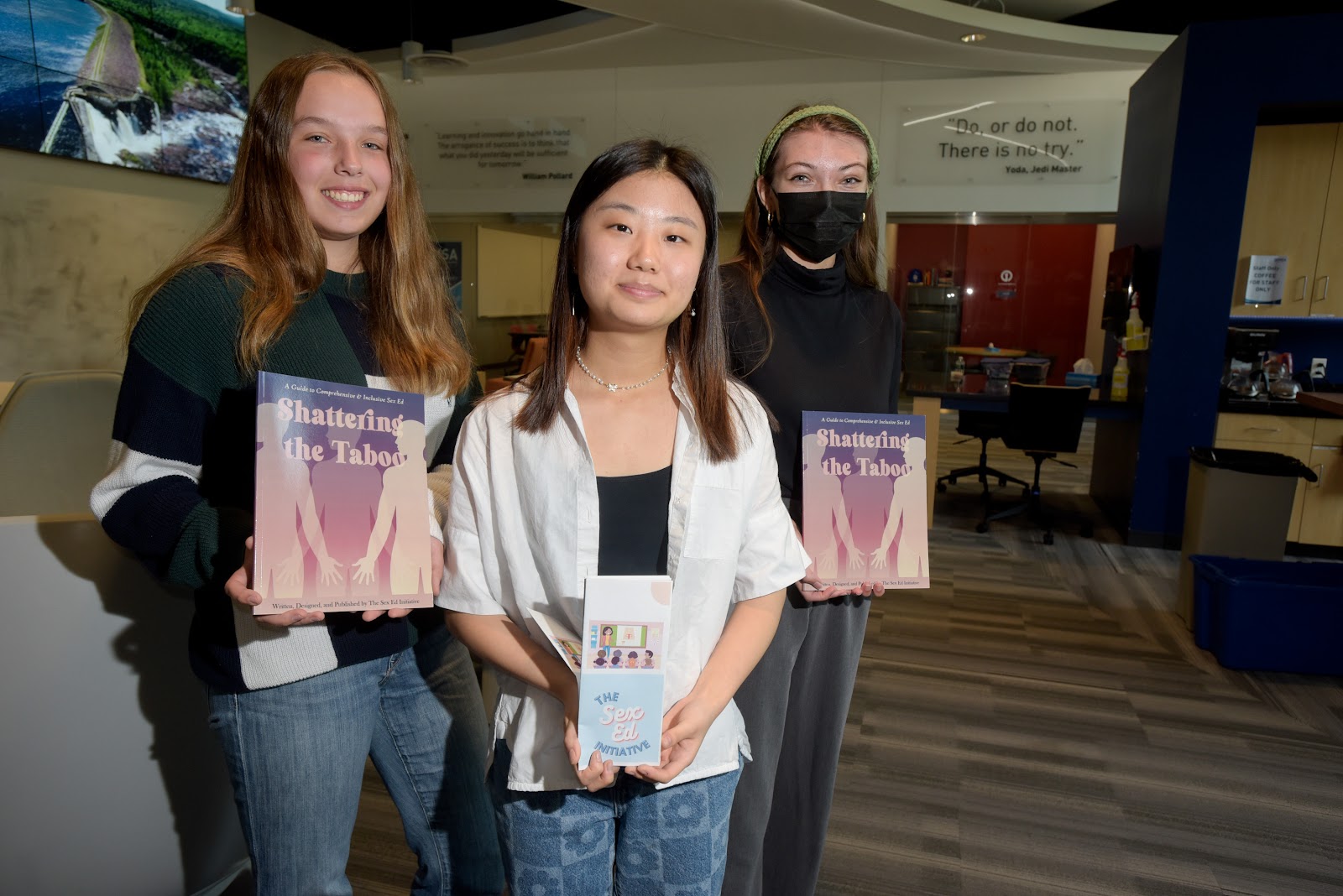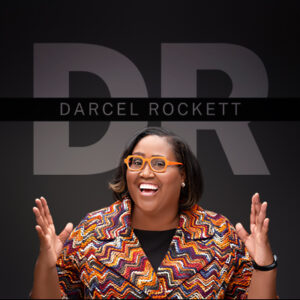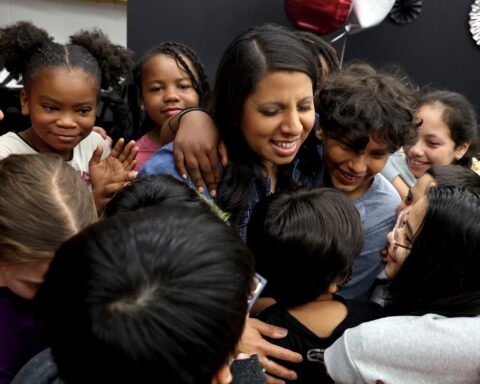Northbrook resident Irene Sooah Park remembers educators and other adults treating sex education as something that should never be talked about outside the classroom. It was during middle school that she recalled a teacher standing in the back of the classroom when discussing the vagina and penis to avoid eye contact with students. And recently, during COVID, she said sex education was left out of her sophomore health class in favor of lessons about bones and muscles.
“I think sex ed can seem daunting at first, but it includes a lot more than just talking about the body, talking about the act of sex itself,” Park, an Illinois Mathematics and Science Academy senior, said. “It can include things like healthy relationships, personal hygiene, just knowing how to keep yourself safe. And I don’t think a lot of people really have knowledge about sex education in that perspective. You can tell there’s a lot of ignorance regarding topics as well. When I first came to the Illinois Math and Science Academy, I overheard this one guy asking: What’s menstruation? I was shocked.”
After experiencing a number of similar interactions, Park founded the Sex Ed Initiative in winter 2021 — a youth-led group centered on showing people sex education is not scary. It is a necessity, however if one wants to be informed about their body and how to keep oneself safe. SEI director Park and fellow SEI members IMSA senior and Canton, Ill., native Sarah Wheeler and Catherine Tang, a senior at Glenbrook North High School in Northbrook, spent the last several months researching, writing, and producing the handbook, “Shattering the Taboo: A Guide to Sexual Health Education.”
The handbook, published and sold on Amazon as of July, is a comprehensive sex education guide for high schoolers — by youth for youth. The SEI group collaborated with medical experts and community advocates throughout Illinois to provide a more inclusive, medically accurate and age appropriate resource that could be used in schools’ sex education curricula. Per Park, the book teaches foundational concepts of sexual health education, including topics such as anatomy, healthy relationships, sexually transmitted infections and more. Each section is accompanied by a worksheet and list of discussion questions.
“We have a section dedicated to gender identity and we also included a section on intersex people,” Tang said. SEI worked with the Illinois Coalition Against Sexual Assault, a unified network of rape crisis centers, on the chapter on personal safety. Coalition Executive Director Carrie Ward said the organization spoke with SEI to talk about issues of sexual violence — something the handbook authors thought was an important part to include.
“One of the things I think they did a really nice job of was focusing on issues pertaining to consent, focusing on issues about boundaries, and a really key element they included was how to get help if you need it,” Ward said. “Those are things that we tell communities all the time; you have the right to make decisions regarding your own body. You have the right to establish your own boundaries, and you have the right to ask for, seek and get help when you want it and it should be readily available to you.
“The students should be commended for the initiative they took in saying, ‘we know there’s a lot of work being done,’ but trying to figure out how to put things together in one place. It’s great to see young people making and creating resources that are specially designed for other young people; I hope that others will find it really helpful as well.”
When researching the book, the young authors looked at examples of how other countries approach sex education and compared those to what national school systems’ curricula and received feedback from physicians such as Dr. Erin Castelloe, a San Diego-based family doctor whose passion project is delivering comprehensive sexuality education to parents and youth groups. SEI reached out to Castelloe to talk with her about California’s sex ed legislation and implementation compared to that of Illinois. Park considers a Castelloe, an Iowa native, a mentor.
“What’s neat about what the young people in the Sex Ed Initiative have done is they wrote the book that they want to see as a starting point,” she said. “This workbook that they’ve created, on so many levels, is demonstrative of how sex ed will change, Is that a small group of people who want to see the change, They’re saying, ‘I want this to change. So I’m gonna put this out there and say, I’m gonna nurture that with every fiber of my being.’ It brings me to tears because honestly, they’re gonna change the world. Sounds trite, but they are and they are doing it now.”
The handbook arrived after Illinois Gov. J.B. Pritzker signed the Keeping Youth Safe and Healthy Act (SB 818) into law in August 2021, making Illinois the first state in the U.S. to formally pass legislation codifying the new national sex education standards developed by SIECUS: Sex Ed for Social Change, a nonprofit that advances sex education. SIECUS’ national sex ed standards were first published in 2012, and updated in 2020. The U.S. Department of Education does not require public schools to teach sex education, and doesn’t recommend specific curriculum.
In Illinois, SB 818 does not override local decision-making granted to school districts, which are not mandated to teach sex education. The ACLU of Illinois said the law preserves the rights of parents to opt their children out while ensuring students are not excluded or stigmatized because of their gender identity. Parents can review curriculum before it’s taught in the classroom. A recent Illinois State Board of Education survey found that during the 2021-2022 school year, 218 Illinois districts offered comprehensive health and sex education and 480 school districts did not.
IMSA President and CEO Evan Glazer said in a statement, the school collaborated with SEI students to include their ideas in the school’s programming which provides age and developmentally appropriate and inclusive information on an array of topics that focus on teaching students about the importance of personal health and safety.
IMSA is not part of a local school district and therefore not governed by a Board of Education, but rather a board of trustees. Additionally, IMSA is under the guidance of the Illinois Board of Higher Education and not the Illinois State Board of Education like most Illinois high schools. IMSA offers every parent or guardian the right to opt-out their child from this programming.
“We are proud of Irene Sooah, Ava and Sarah, as well as all of our students, who are driven by fascination and a desire to be thoughtful inquirers, integrative thinkers, ethical leaders and problem solvers,” Glazer said. “IMSA is a place where students and colleagues are encouraged to invent and test new ideas, collaborate with each other to make improvements and then share their discoveries broadly to create a better future for Illinois and beyond.”
Tang hopes their book will help educators shift away from an abstinence-only mindset when it comes to curricula. Wheeler said SEI has been reaching out to parents on social media to get them on board with their sex ed reform efforts. SEI works with people in schools throughout the country. They already have five charters, four in northern Illinois.
“We worked with Lurie Children’s Hospital, the ACLU, the Illinois Coalition Against Sexual Assault, UIC School of Public Health and SIECUS to get their input on the research,” Park said. “We took into account SB 818 because it’s a really robust curriculum that we could go off of. We wrote stuff out with diagrams that are detailed enough so people can understand. We’re selling them in hopes that schools can implement it as a guiding curriculum for their schools. We were hoping that this can be a starting point they can go off of and remove things and add things as they need.”
SEI asked Dawn Ravine, sexuality education program coordinator at Lurie Children’s Hospital of Chicago to review the handbook. Ravine said she is grateful for all the youth organizers in the state taking an interest around this topic.
“Chicago’s had a really inclusive and wonderful sex ed policy for quite some time,” she said. “But you go into the smaller rural communities, suburban communities, and there’s still a lot of variation on what’s being provided. These national standards are used by a lot of organizations including Lurie’s program to think in a more holistic way about the progression of topics and communication that young people need to grow into happy and healthy individuals.”
Ravine applauds members of SEI, saying when students ask for sex ed information, not seeing themselves in a curriculum, change happens much more quickly.
“Student organizing is the move,” Ravine said. “There still will be a need in each and every community for student leaders like this wonderful Sex Ed Initiative group to continue to look at their own school districts to see what other advocacy they can do. Our young people tell us all the time: We are looking for really inclusive, thoughtful dialogue. I’m hoping this group of young people are going to inspire young people across our state.”
A digital version of the handbook is being developed, and conversations on creating handbooks for middle and elementary age ranges are taking place, Park said. Proceeds from the sale of the handbook will go toward reproductive justice endeavors (a $500 GoFundMe is helping with that.)
“After the Roe v. Wade situation, we did want to donate to abortion funds across the country, in addition to other sex ed projects going on so that we can fund other places that are in need of sex education, and the schools that need teachers or materials,” Park said.
Supriya Mehta, an epidemiologist and professor at University of Illinois at Chicago’s School of Public Health and Rush University’s Department of Internal Medicine, whose work and research is largely around sexual and reproductive health said she was impressed with SEI’s handbook.
“The comprehensiveness, and the accessibility of it and the format of it, so I’m not aware of other teenagers doing quite as much or what they did,” she said. “The commitment from young people and the fact that they took on a topic that could be perceived as controversial … it takes a lot of commitment and guts from young people to do that, to put something together from start to finish.”
Comprehensive, but succinct is how Mehta describes the SEI publication.
“Because it comes from the perspective of teenagers, they’re including topics that adults might not think to talk about,” she said. “For example, the concept of boundaries. Most sex education or most adults would talk about it specifically in the context of sexual activity, but they (SEI) really expand that outside — that it’s a skill or a mindset to develop and apply in other areas. They did a really nice job with contextualizing sexual health and sexual education to the adolescent, teenage young adult experience.”
Tang said the message that the initiative emphasizes is sex education isn’t something that only adults can partake in, youth can and should take part in the conversation and make change at their own schools. Park said their hope is that the handbook is used as a guide for schools’ curricula, a general outline for important topics. Park said she’s spoken with some Chicago Public School students about it, however CPS administration hasn’t heard about the handbook yet. She said SEI is also working with local organizations to use the handbook as a guide for bridging the gap between parents and children when discussing sex education.
“We are partnering with the American School Health Association (a multidisciplinary professional association that fosters and implements innovative approaches to improving school health and delivering quality health education) to support a group of student activists for sex ed at their own schools by offering training sessions every month,” Park said. “We are also working with college professors and other experts in the field of sex ed to cover the history of sex ed in the hopes that people can look at the development of sex ed to improve upon it for the future. It will be released in a podcast format through Spotify later this month and throughout October.”
Jeanie Alter, executive director of the American School Health Association, said SEI is seeking funding to activate students into becoming champions for comprehensive and inclusive sex education.
“This effort will better the well-being of students in Illinois and across the country by better educating students about reproductive health, puberty, consent, and healthy relationships,” she said. “The science of health education supports a comprehensive model of sex education that includes STI prevention, contraception, and inclusive information so that students can make informed decisions for their health.”
“There’s more to sex ed than sex,” Wheeler said. “I feel like that’s what people focus on because it’s literally in the title. But there’s so much important information about making informed decisions, forming and maintaining healthy relationships, what a red and a green flag looks like, that is crucial to making good decisions throughout adulthood that may not even be related to sex.” SEI’s handbook highlights that.
“Because we are the recipients of the education, I think we have a right to shape what we want to learn about and what we think is relevant to society now,” Park said. “When our parents learned sex education, sexting probably wasn’t a thing, but it is now. I think just because you’re the recipient of the education, doesn’t mean you don’t have a right to shape how it should be taught in schools. That’s a message that I want people to know.”


